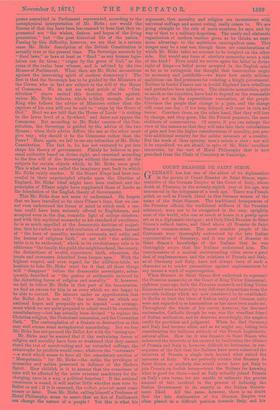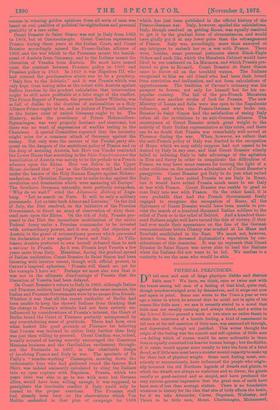COUNT BRASSIER DE SAINT SIMON.
GERMANY has lost one of the ablest of its diplomatists in the person of Count Brassier de Saint Simon, repre- sentative of the German Empire at the Court of Italy, whose death at Florence, in the seventy-eighth year of his age, was announced in the telegrams of a week ago. There was French polish as well as French blood in this German wearer of the name of the Saint Simons. The traditional brusqueness of the Prussian official, the traditional stiffness of the Prussian aristocrat, were not to be recognised in the easy, sprightly man of the world, who was as much at home in a gossip upon art as in a diplomatic intrigue and Italy liked Brassier de Saint Simon's refined tastes, and liked above all Brassier de Saint Simon's common-sense. The most sensible people of the Continent were thoroughly understood by the late Italian representative of Germany, and it was part of Brassier de Saint Simon's knowledge of the Italians that he was thoroughly aware that the Italians understood him. The consciousness of a mutual understanding often saves a good deal of unpleasantness, and the relations of Prussia and Italy, as of Germany and Italy, have not always been of such a character as to render precautions against unpleasantness by any means a work of supererogation.
When Brassier de Saint Simon first undertook to represent the Prussian monarchy at the Court of King Victor Emmanuel, eighteen years ago, both the Prussian monarch and King Victor Emmanuel were actuated by very different dispositions from the amicable feelings which are now considered to be established. In Berlin at least the ideas of Italian unity and German unity were not regarded as so harmonious as has since been made out. Throughout the whole of his career, however, the deceased ambassador, Catholic though he was, was the steadfast friend of Italian unification, and he deserves, accordingly, the amplest credit for prevision and judgment. When he died Germany and Italy had become allies, and as we might say, taking into consideration the bellicose attitude of the French Legitimists, natural allies. How far it was Brassier de Saint Simon who subserved the interests of his country by facilitating the alliance of Prussia and Italy is, however, difficult to determine, in con- sequence of the fact that the Italians have never subserved the interests of Prussia a single inch beyond what suited the interests of Italy. We are perfectly certain that Brassier de Saint Simon or anybody else would never have got Italy to join Prussia on foolish terms—trust the Italians for knowing what is good for them—and as Italy actually joined Prussia on Italy's own terms, we are unable to estimate the precise amount of tact involved in the process of inducing the Italian Government to do exactly as the Italian Govern- ment liked. All the same, however, there is no doubt that the late Ambassador of the German Empire was often placed in a difficult position towards Italy, and his
success in winning golden opinions from all sorts of men was based on real qualities of political far-sightedness and personal geniality of a rare order.
Count Brassier de Saint Simon was not in Italy from 1863 to 1868, but at Constantinople. Count Usedom represented Prussia during these years at the Italian Court, and Count Brassier accordingly missed the Prusso-Italian alliance of 1866, and the war which to the Prussians meant the banish- ment of Austria from Germany, and to the Italians meant the liberation of Venetia from Austria. He must have mused upon the contrast between Prussian policy in 1866 and Prussian policy in 1859. In 1859 it was Napoleon III. who had uttered the proclamation which was to be a prophecy. "Italy free to the Adriatic," and it was Prussia which was only kept from taking sides at the outset with Austria against Italian freedom by the prudent calculation that intervention might be still more profitable at a later stage of the conflict. The Prince Regent of Prussia, the present Kaiser Wilhelm, was as full of dislike to the doctrine of nationalities as a Holy Alliance Prince ought to be, and as jealous of French influence as the future ruler of united Germany ought to be. The Ministry, under the presidency of Prince Hohenzollern- Sigmaringen, was very properly hesitant and observant, but there was no want of expressions of warlike feeling in the Chambers. A special Committee reported that the necessity might arise for a common attack of Germany against the enemy. Not only were the orators of the Feudal party elo- quent on the dangers of the ambitious policy of France and on the duty of assisting Austria, but Herr von Vincke reminded the Lower House that according to the Ide'es Xapole'ordennes the humiliation of Austria was merely to be the prelude to a French advance upon the Rhine. Herr von Below in the Upper House declared that "just as the Christian world had united under the banner of the Holy Roman Empire against Moham- medanism, so Christian Europe was to unite to-day against the revolution and domination which were menacing all Europe." The Southern Germans, naturally, were perfectly outspoken. "Why do we wait ?" cried the Allgemeine Zeitung of Augs- burg. "Let us march on Paris. It will be only a military promenade. Let us take back Alsace and Lorraine," On the 2nd of July, the Diet resolved, on the initiative of the Prussian Government, to direct an army of observation of sixty thou- sand men upon the Rhine. On the 4th of July, Prussia pro- posed to the Diet the immediate mobilisation of the entire Federal Army under a Prussian commander to be invested with extraordinary powers, and it was only the objection of Austria to the grant of extraordinary powers which prevented the declaration of war against France and Italy. At Villa- franca Austria preferred to own herself defeated than to seek a saviour in Prussia. As it was, Prussia kept Venetia a few years more from Italy. Meantime, during the gradual spread of Italian unification. Count Brassier de Saint Simon had been listening with interior assent, though with official protest, to Cavour's inspired aphorism, "Prussia will thank me yet for the example I have set." Perhaps we must also own that it was not to the ultimate disadvantage of Prussia that the liberation of Venetia had been delayed.
On Count Brassier's return to Italy in 1868, although Italian and Prussian soldiers had fought against the same enemies, the Italian and Prussian Governments were by no means firm friends. Whether it was that all the recent cordiality of Berlin had been unable to keep the shrewd Italians from thinking that the change in Prussia's attitude had not been entirely un- influenced by considerations of Prussia's interest, the Court of Berlin found the Court of Florence perfectly unimpressed by any overwhelming sense of gratitude. There had been even what looked like good grounds at Florence for believing that Prussia was inclined to utilize Italy further than Italy was just then willing to proceed. Count Usedom was, indeed, broadly accused of having secretly encouraged the disastrous Mentana business, and the Garibaldian excitement through- out the Peninsula in 1867, in the charitable design of involving France and Italy in war. The spectacle of De Failly's " wonder-working " Chassepots, mowing down the enthusiastic boys who had gathered round the famous Red Shirt, was indeed eminently calculated to sting the Italians into an open rupture with Napoleon. Prussia, which two years later was able to go to war with none but German allies, would have been willing enough, it was supposed, to precipitate the inevitable conflict if Italy could only be
roused to the proper exertions. The Prussian staff had already been busy on the observations which Von Moltke embodied in that plan of campaign for 1868
which has just been published in the official history of the Franco-German war. Italy, however, spoiled the calculations. Italy, though resolved on getting Rome, was equally resolved to get it by the gradual force of circumstances, and would have gladly got it at any lower price than the estrangement of France. Italy was accordingly, more than annoyed at any intrigues to embark her on a war with France. There were, besides, some personal jealousies about Black-Eagle Orders and such like, which the Menabrea Cabinet would have liked to see conferred on La Marmora, and which Prussia pre- ferred to give to Ricasoli. Count Brassier de Saint Simon came to throw oil on the troubled waters. The Italians recognised in him an old friend who had been their friend from conviction and inclination, and not from calculations of opportuneness. The tradition of Cavonr's intimacy was his passport to favour, not only for himself but for his un- popular country. The fall of the pro-French Menabrea Cabinet was another stroke of luck for Prussia. The new Ministry of Lanza and Sella were less open to the Napoleonic influence, and when the Franco-German war broke out, Brassier de Saint Simon had the satisfaction of seeing Italy refuse all the invitations to an anti-German affiance. The countrymen of Count Brassier attach great weight to the activity of their Italian representative at this crisis, and there can be no doubt that Prussia was remarkably well served at Florence during the war. When, however, we reflect that the anti-French policy of Italy was limited to the occupation of Rome, which we may safely suppose had not ceased to be desired by Italy in any case, and that Count Brassier utterly failed in inducing Italy to take advantage of the agitation in Nice and Savoy in order to complicate the difficulties of France, we may have some reasons for turning the light of a sober criticism on the excessive admiration of Count Brassier's panegyrists. Count Brassier got Italy to do just what suited Italy. It may have suited Prussia to see Italy in Rome, but it would have suited Prussia much more to see Italy at war with France. Count Brassier was unable to goad or coax Italy into war with France. On the other hand, it is very probable that had the French Government freely engaged to recognise the occupation of Rome, all the diplomacy of Count Brassier would have been unable to pre- vent the march of a hundred thousand Italian soldiers to the relief of Paris or to the relief of Belfort. And a hundred thou- sand Italians might well have turned the tide of victory, if they had ever made their appearance on the line of the German communications before Chanzy was crushed at Le Mans and Bourbaki annihilated in the East. We must not, however, detract from the deceased diplomatist's reputation by con- siderations of this character. It was no reproach that Count Brassier de Saint Simon was never able to lead the Italians when the Italians did not want to be led. We confess to a curiosity to see the man who would be able.



































 Previous page
Previous page